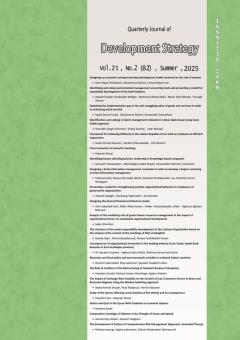Designing an economic entrepreneurship development model centered on the role of women
Subject Areas : اقتصادیAmin Najaf Goli Dost 1 , Gholamreza Rahimi 2 * , Farhad Nejad irani 3
1 - Ph.D. Student in Comparative Management, Department of Public Administration, Bonab Branch, Islamic Azad University, Bonab, Iran
2 - Assistant Professor, Department of Public Administration, Bonab Branch, Islamic Azad University, Bonab, Iran
3 - Assistant Professor, Department of Public Administration, Bonab Branch, Islamic Azad University, Bonab, Iran
Keywords: women's entrepreneurship, East Azerbaijan province, women's empowerment, individual characteristics, economic support, creating a supportive environment, cultural development.,
Abstract :
Abstract Background and purpose: The presence of women in the society shows the role of this stratum more in economic processes, which makes it necessary to pay attention to it. Based on this, the present research was conducted with the aim of designing a model of economic entrepreneurship development centered on the role of women. Methods: From the point of view of the goal, the current research is developmental and has a mixed approach (qualitative and quantitative), which is in the form of an interpretive paradigm in the qualitative part. The data collection tool was semi-structured interviews. The research community was 15 people from 15 entrepreneurship experts in the field of women and university professors who were selected purposefully based on theoretical saturation. Thematic analysis strategy was used to analyze the obtained data. Findings: The findings of the research showed that five main themes and twenty organizing themes of women's empowerment (scientific promotion of women entrepreneurs, communication skills, women's skill enhancement), individual characteristics (women's action initiative, women's responsibility, spirit self-belief); economic support (financial incentives, tax support, facilities and loans); Creating a supportive environment (supporting families, legal support, forming entrepreneurship support units and institutions, introducing entrepreneurs, facilitating processes, facilitating marketing); Cultural development (cultural improvement of the society, promoting the spirit of teamwork, changing the traditions of the society, trusting women, changing the attitude towards gender). Conclusion: According to the findings of the research, one of the effective factors in achieving the promotion of women's entrepreneurship in East Azarbaijan province is women's entrepreneurship, which is carried out by using women's empowerment, individual characteristics, economic support, creating a supportive environment, and cultural development. to be The contribution of this research is the development of an integrated framework for entrepreneurship development that provides suggestions to its managers regarding the development of women's entrepreneurship and future researchers.
منابع و مأخذ
اميدي نجفآبادی، مريم؛ سلطاني، شهره. (1395). كارآفريني و زنان روستايي. ماهنامه علمي ترويجي جهاد، 272، 56-66.
بیگ زاده، بهمن. (1402). بررسی جایگاه کارآفرینی در توسعه اقتصادی و اجتماعی. اولین همایش بینالمللی مدیریت، حسابداری و اقتصاد با رویکرد نگاهی به آینده، بوشهر.
پناهی، فاطمه. (1402). توسعه کارآفرینی زنان روستایی؛ چشم اندارها و چالشها. جغرافیا و روابط انسانی، 6(23)، ۵۴۵ – ۵۶۵.
خسروی، سهیلا؛ داوری، روشنک. (1403). نقش زنان بختیاری در توسعه گردشگری و اقتصاد محلی با تأکید بر کارآفرینی اجتماعی و تولید پوشاک سنتی در الگوواره پایدار. زن در فرهنگ و هنر، 16(3)، 377-398.
صادقی، حسین؛ عباسپور، اژین؛ شاهمرادی، گودرز. (1402). فراتحلیلی در زمینۀ تأثیر نگرش فرهنگی بر توسعۀ کارآفرینی اجتماعی زنان. زن در توسعه و سیاست، 21(4)، ۹۲۳ – ۹۴۲.
عاشوری، مهدی. (1400). نقش فناوری اطلاعات در توسعه کارآفرینی.سومین کنفرانس ملی مطالعات جدید در کارآفرینی و مدیریت کسبوکار، سمنان.
گلرد، پروانه. (1394). عوامل مؤثر در توسعه كارآفريني زنان ايراني. زن در توسعه و سياست (پژوهش زنان)، 3(1)، 101-123.
ورکیانی پور، نفیسه؛ حسینی؛ سید محمدرضا؛ سمیعی، روح¬الله، اشرفی، مجید. (1403). تحلیل عوامل مؤثر بر توسعه کارآفرینی زنان و اثرات آن بر توسعه پایدار اجتماعی در مناطق شهری. تحقیقات کاربردی علوم جغرافیایی، 24(74)، ۳۸۸-۳۶۸.
یاسوری، مجید؛ نوروزی¬نژاد، معصومه. (1400). فراتحلیل کیفی ابعاد توسعه کارآفرینی زنان روستایی. زن در توسعه و سیاست، 19(1)، 21-41.
Adhikari, B. A. (2024). Investigating the Factors Influencing Women's Entrepreneurship in Nawalparasi District. Journal of Management Technology & Social Sciences, 3(1), 2705-4845.
Baycan Levent, T., Masurel. E., Nijkamp, P. (2018). Diversity in entrepreneurial: rthnic and female roles in urban economic life. International journal of social economic, 30 (11), 1131-1161.
Hechavarria, D. M., Guerrero, M., Terjesen, S., Grady, A. (2024). The implications of economic freedom and gender ideologies on women's opportunity-to-necessity entrepreneurship. International Journal of Entrepreneurial Behaviour & Research. 43(4), 655-669.
Hulsink, W., Doans, H. (2020), Pathways to High-Tech Valley and Research Triangles, Springer.
Kantor, P. (2002). Promoting Women s Entrepreneurship Development Based on Good Practice Programmes: Some Experience From the North to the South. ILO S In Focus Programme, Working paper, 9: 79.
Sharma, P. (2020). Women entrepreneurship in India: The socio-economic context, materialstoday, (https://doi.org/10.1016/j.matpr.2020.09.437)
Ojong, A., Simba, A., Dana, L.P. (2021). Female entrepreneurship in Africa: A review, trends, and future research directions. Journal of Business Research, 132(2021), 233-248.
Rosca, E., Agarwal, N., and Brem, A. (2020), Women entrepreneurs as agents of change: A comparative analysis of social entrepreneurship processes in emerging markets. Technological Forecasting and Social Change, 15(1), 18-25.
Thompson, E. R. (2009). Individual entrepreneurial intent: Construct clarification and development of an internationally reliable metric. Entrepreneurship: Theory and Practice, 33(3), 669–694.

